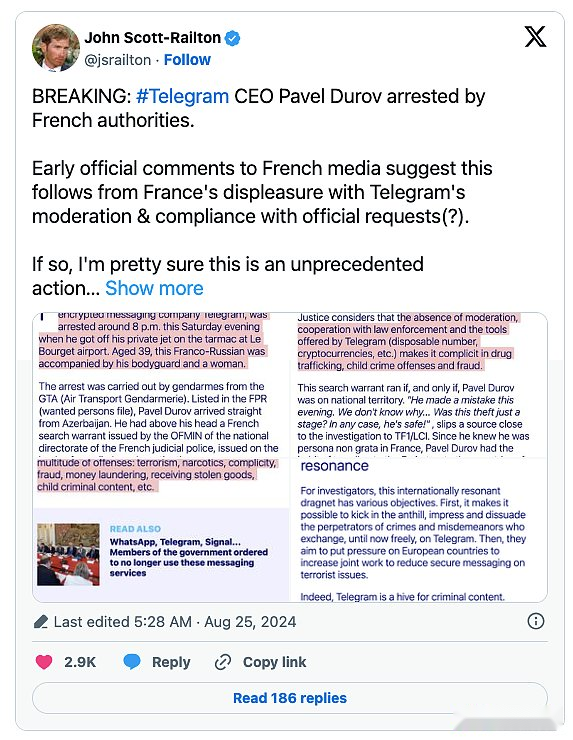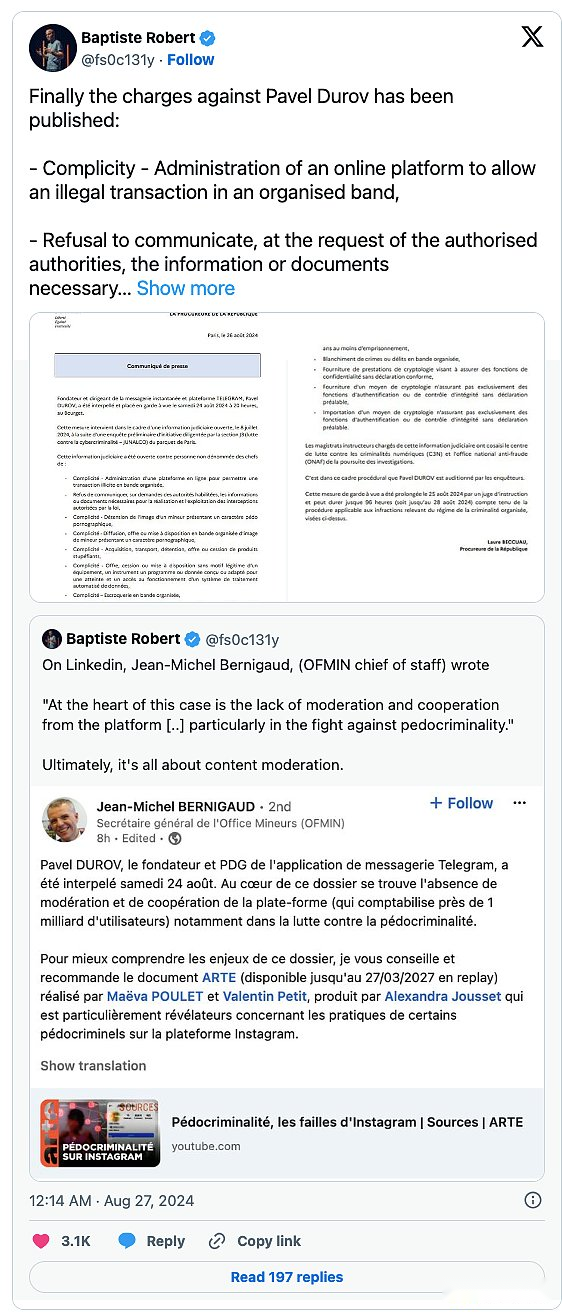
Author: Preston Byrne, Partner at Byrne & Storm Law Firm; Translated by: 0xjs@Bitchain Vision
On August 24, the founder of the popular messaging app Telegram, Pavel Durov, was arrested when his private plane landed in France.
Early signs indicate that the arrest stems from Telegram’s alleged failure to comply with French requirements for content review and data disclosure:

Some legal background
Most non-Chinese, globally influential social media companies are headquartered in the United States.This is no accident.
The United States took policy initiatives in the late 1990s to minimize the responsibility of network service operators, most notably the enactment of Section 230 of the Communications Decency Act.The bill (substantially) provides that social media website operators are not responsible for infringement or crimes of their users.Of course, there are some very narrow exceptions to this rule; for example, illegal pornography must be subject to mandatory deletion and reporting systems (see: 18 US Code § 2258A), and the passage of FOSTA-SESTA prohibits operators from providing sexual intercourseServices of transactions or prostitution (see: United States v. Lacey et al. (Backpage), 47 US Code § 230(e)(5)).
In addition, social media website operators are generally not responsible for the user’s infringement or criminal acts.If they simply host content passively, they will not be held responsible based on the helper/bestor theory.(See: Twitter v. Taamneh, 598 US _ (2023 ) – At least in the United States on this Atlantic Ocean, civil liability for help and abet requires “informed and substantial assistance”, while federal criminal liability—because Section 230 does not apply toState Criminal Code – requires specific intentions to assist in the crime).
This means thatIf I use Facebook to organize a drug deal, Facebook (a) has no obligation to scan for illegal use of its services and (b) has no obligation to limit that use and is not usually subject to civil penalties for my abuse unless Facebook is “substantive”To sexually promote the illegal use, that is, to clearly encourage the illegal use(See, for example, Force v Facebook, 934 F.3d 53 (2d Cir. 2019), where Facebook was found to be not civilly liable to Hamas victims who use Facebook to spread publicity online under JASTA; see also Taamneh, above), and (a) under Section 230 of the State Criminal Code, and (b) under Federal Criminal Code, no criminal offence is under 18 USC § 2 as long as Facebook does not intentionally and knowingly aid, abet, instigate or facilitate the crime of committing a crime.responsibility.
Most countries do not have such tolerant systems.France is one of them.For example, the Loi Lutte Contra la Haine sur Internet Act issued in 2020 stipulates that if global Internet companies fail to limit “hate speech” on their websites (in the United States, hate speech is “protected speech””), a fine of $1.4 million per time, with a maximum fine of 4% of its total global revenue.Similarly, Germany has its own law, the Cyber Enforcement Act (sometimes called the “Facebook Act”, but usually referred to as NetzDG) that stipulates that incitement political content must be removed, otherwise the government has the right to impose a fine of more than €50 million.
I’m not a French lawyer, so it’s hard to figure out what exactly are legislative provisions invoked here.The charge document or warrant will tell us more information after it is published.I’m pretty sure the U.S. will not file a fine lawsuit against Telegram Messenger, Inc. under hate speech laws, such as the EU DSA, because if it were us, Durov wouldn’t be handcuffed and dragged off the plane.French media TFI Info, who reported the news, said the charges could be a crime of aiding and abetting, or a conspiracy:
The Ministry of Justice believes that the lack of audits, cooperation with law enforcement, and the tools provided by Telegram (one-time numbers, cryptocurrencies, etc.) make it an accomplice of drug trafficking… and fraud.
After the arrest warrant is released, more information will be disclosed.For example, if Durov is found to be actively helping criminal users access the platform, for example, a drug addict wrote to a support channel saying, “I want to sell drugs on your platform. What should I do?” Durov repliedIf he will help, he will encounter the same bad luck in the United States and France.
However,If the French simply say that Durov’s failure to regulate his users or respond to French requests for documents in a timely manner is a crime (I suspect that is the case), then this represents a sharp escalation of the war on cyber censorship.This means that European countries will try to specify overseas what content foreign companies can host on foreign web servers and cannot host.
If correct, this would be very different from the current practices that most U.S.-based social companies adopt to comply with U.S. regulations, which often dominate the global compliance strategies of most non-Chinese social media companies, including those that do so on their servicesFully encrypted companies (including Telegram, WhatsApp and Signal).In short, these platforms believe that they are unlikely to be criminally charged if they do not intend to use their platform for crime.Obviously, the situation is different now.
Telegram isn’t the only company in the world that uses social media platforms for illegal purposes.As we all know, Facebook’s popular encrypted messaging app WhatsApp has been used by the former non-state terrorist organization and current ruler of Afghanistan for many years.This fact was widely known by NATO generals during the Afghan war and reported in the media, and even again in the New York Times last year:
About a month later, security officers were reluctant to buy a new SIM card, opened a new WhatsApp account, and began to recover lost phone calls.Number and rejoin WhatsApp group.
Inkayad sat in his police station, a modified container with a handheld intercom on it.He took out his cell phone and began browsing his new account.He pointed out all the groups he joined: one is a group of all police officers in his jurisdiction, another is a group of former warriors loyal to a single commander, and the third is a group he used to communicate with his superiors at the headquarters.He said he joined a total of about 80 WhatsApp groups, more than a dozen of them for official government purposes.
Of course, the Taliban now controls the entire government of Afghanistan—all levels—and Afghanistan is the enemy of the United States, and Facebook’s home country is the United States.If Facebook really wants to stop people like this from using their services, the most effective way is not to play gopher games with individual government employees like Facebook does, but to ban the entire IP range and all Afghan phone numbers in Afghanistan and ban it and ban it from using itDomestic app downloads, and Facebook doesn’t do that.Facebook chose measures that are inaction, not measures that are effective.
However, Facebook CEO Mark Zuckerberg lives comfortably on a Hawaii estate, not in exile, and probably no warrant issued a warrant for him, and Durov obviously has it.I admit that Facebook may (even very likely, because Telegram’s operations team has only 15 engineers and about 100 employees worldwide) are more responsive to French judicial requests than Telegram.but,When you run a globally accessible crypto platform, it is inevitable—repeat, inevitable, absolutely certain—that criminal activity beyond your horizon or control can occur.
If Telegram is accused of violating French law for its failure to manage (as media reports point out), then an application like Signal (which obviously cannot respond to law enforcement requests for content data and has similar features to Telegram) is alsoJust as guilty, and no American social company (or its top leaders) that provides end-to-end encryption is safe.Do we really think if Meredith Whitaker (Chairman of Signal) decides to go to France, she should go to jail?

Images licensed under Pixabay license
There are still many problems.At present, this is not optimistic for the future of interactive network services in Europe.American tech entrepreneurs operating services in accordance with American values (especially through strong encryption to protect freedom of speech and privacy) should not visit Europe, should not recruit employees in Europe, nor should they host infrastructure in Europe until this situation is resolved.
France’s crime of aiding and abetting
Updated on August 26, 2024
Basically my hunch is correct:

There is a long list of crimes listed there.Most of this is related to the crime of conspiracy in France, which roughly equates to the responsibility of the United States’ aider/bestor.
What is important here is,In the United States, the assister/being responsibilities require specific intentions to lead to a criminal outcome——That is, the crime is the purpose of the defendant.American social media companies fail to regulate their users yet to reach this level, which is why American social media companies CEOs are not generally arrested by the U.S. government for their users’ crimes.In particular, the CSAM allegations will only rise to the level of crime in the United States if Durov fails to comply with the notice-and-reporting regime for such content.The mere existence of criminal content without any notice does not cause criminal liability.
The French government accused Durov of participating in (i.e. assisting and abetting) criminal activities and providing “encrypted” software without permission,Crypto products must be approved by the government before they are used in France.The crimes he was accused of assisting include crimes that are roughly similar to the Anti-Fraud and Corrupt Organization Act, compilation of crimes, money laundering, drugs, hacking and providing unlicensed encryption technology.
There is a lack of evidence that Durov and Telegram have explicitly intentionally committed these crimes or result in the occurrence of these crimes (It is extremely unusual for social media CEOs to do so, especially since these crimes are illegal around the world, including the United States, which has been historically very good at extradition criminals.), so there is no reason not to file similar allegations against any other social media service provider in France, as long as their audit practices are incomplete, especially providing end-to-end encryption of social media services.
We need to wait for the evidence to come out before we can draw any definite conclusions on this point.My guess, however, is that Durov is not “assisting and abetting” as the United States understands, and France has decided to use different principles to try to regulate a foreign company because France believes that the audit policies of these companies are too loose.
To summarize:
Currently, if you run a social media company, or you offer encrypted messaging services that are accessible in France and your headquarters are based in the United States, then leave Europe.
Original link: https://prestonbyrne.com/2024/08/24/thoughts-on-the-durov-arrest/








